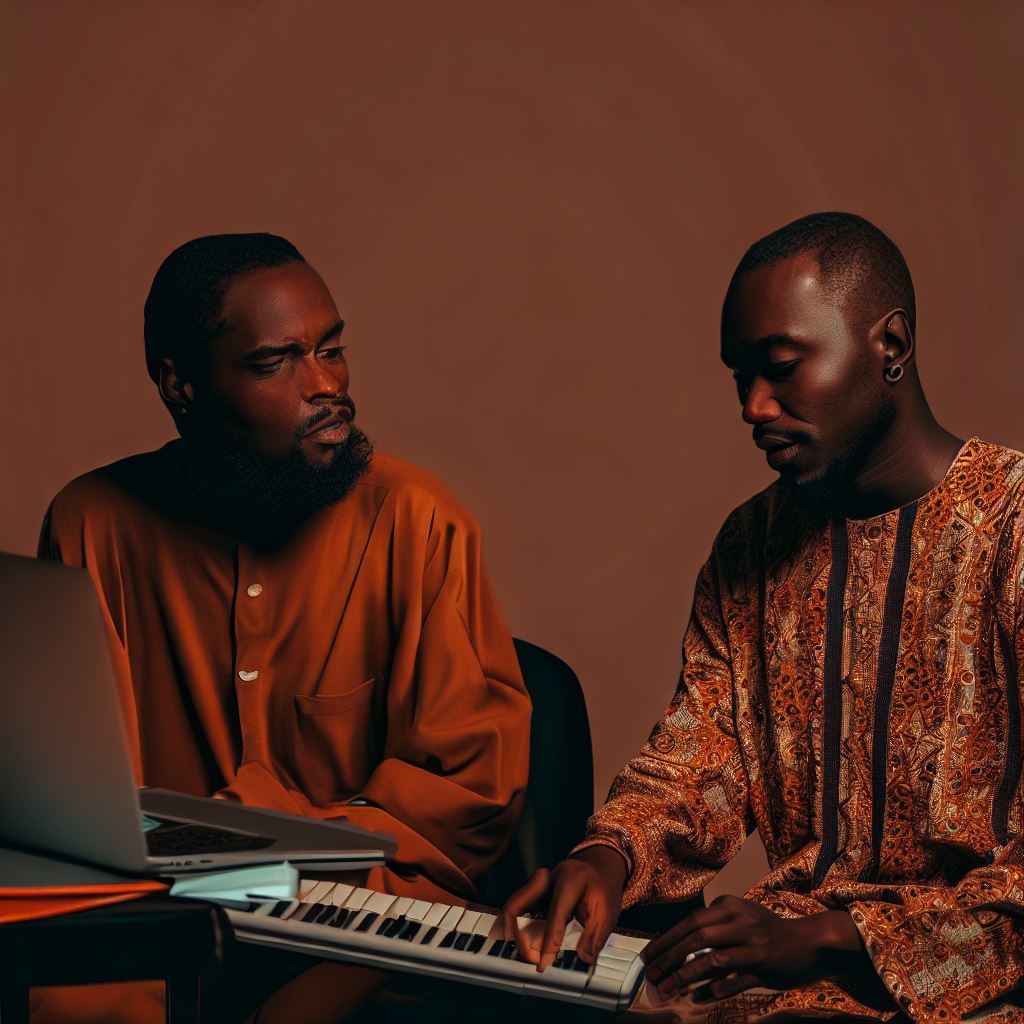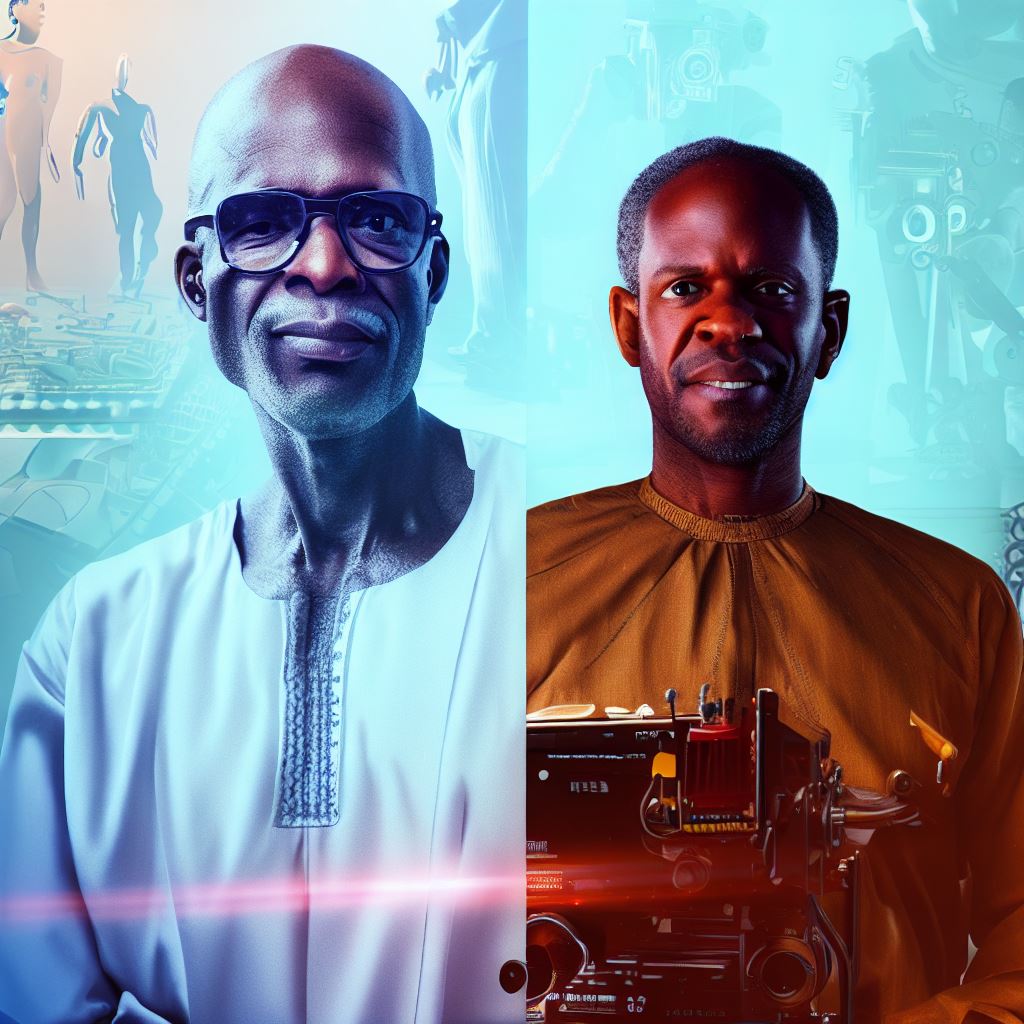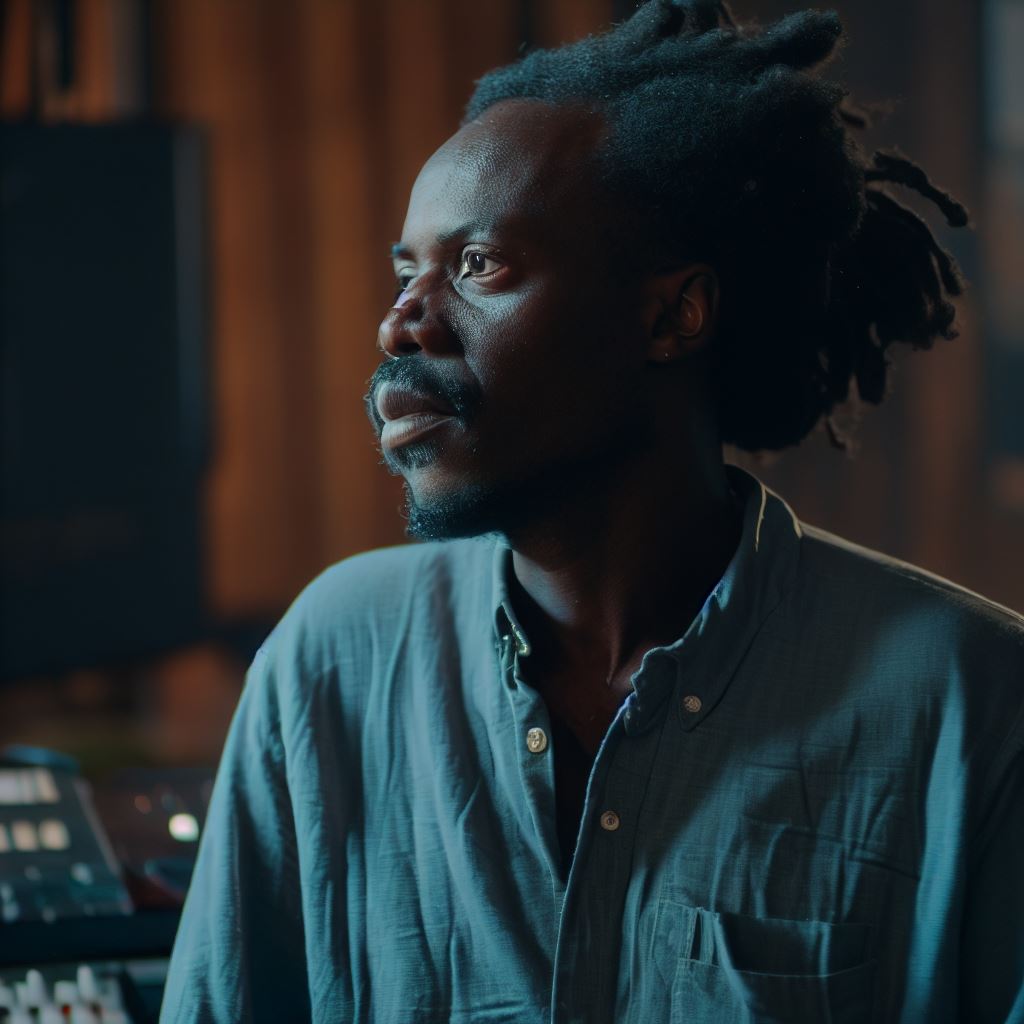Introduction
Let’s explore collaborating as a composer in Nigerian cinema.
Nigerian cinema, also known as Nollywood, has gained international recognition for its prolific film industry.
With over 2,000 movies produced annually, it is the second-largest film industry in the world.
In Nigerian cinema, a composer plays a crucial role in creating the soundtracks that enhance the storytelling.
They are responsible for composing original music and selecting or adapting existing tracks to fit the scenes.
As the heartbeat of the film, the composer sets the mood, evokes emotions, and enhances narrative elements.
They work closely with the director, producers, and sound designers to understand the vision and create a unique soundscape for the film.
The composer’s creative process involves analyzing the film’s characters, themes, and storyline to develop a musical language that complements the visuals.
They use instruments, melodies, and rhythms to elicit specific emotions and intensify the audience’s engagement with the narrative.
The composer must collaborate with the director and other members of the creative team to ensure their vision aligns with the music.
This involves constant communication, sharing ideas, and making adjustments to achieve a cohesive and impactful result.
Additionally, the composer may collaborate with local musicians, incorporating traditional Nigerian instruments and melodies into the score to reflect the cultural richness of the film.
This fosters artistic diversity and promotes local talent.
In short, the role of a composer in Nigerian cinema is essential for creating an immersive and emotionally captivating experience for audiences.
Through collaboration and creativity, composers contribute to the unique identity of Nigerian films and showcase the rich cultural heritage of the country.
Importance of Collaboration in Nigerian Cinema
The collaborative nature of filmmaking
Collaboration plays a vital role in Nigerian cinema.
The film industry in Nigeria, known as Nollywood, has experienced tremendous growth over the years, and this growth is further propelled by the collaborative efforts of various professionals involved in filmmaking.
From the inception of a film project, collaboration begins to take shape.
The director orchestrates the entire production process, bringing together actors, screenwriters, cinematographers, and composers, among others.
Each professional contributes their skills and expertise, resulting in a rich tapestry of creativity and talent.
The collaborative nature of Nigerian cinema allows different perspectives to merge, creating a harmonious blend of ideas.
Together, the team works towards a common goal – to tell a compelling story through film.
The coordination between different departments ensures that the vision of the director is effectively translated onto the screen.
How collaboration enhances the overall quality of films
Composers, in particular, play a vital role in enhancing the overall quality of Nigerian films through collaboration.
By working closely with filmmakers, they understand the director’s vision and incorporate the film’s narrative into their musical compositions.
Effective communication is crucial to align the music with the intended emotional impact of each scene.
The collaborative process also allows for feedback and adjustments.
Filmmakers and composers can fine-tune the music to match the pacing, mood, and tone of the film.
This synergy between visual and auditory elements creates a cohesive and immersive cinematic experience, captivating the audience and enhancing the storytelling.
The unique challenges faced by composers in Nigerian cinema
However, composers in Nigerian cinema face unique challenges within this collaborative framework.
Tight production schedules, driven by the industry’s rapid growth, often provide them with limited time for composition.
The pressure to deliver high-quality music within these constraints can be daunting.
Additionally, composers must consider the cultural context and local nuances when creating music for Nigerian films.
This understanding adds authenticity and depth to their compositions, elevating the overall cinematic experience.
Nevertheless, it requires meticulous research and sensitivity to ensure accurate representation.
Securing funding for music production is another challenge faced by composers in Nigerian cinema.
High-quality music requires adequate resources, including recording equipment, talented instrumentalists, and professional sound engineers.
Collaborating with filmmakers becomes essential for accessing the necessary financial support.
In fact, collaboration plays a crucial role in Nigerian cinema, promoting teamwork, creativity, and the delivery of exceptional films.
Composers, along with other professionals involved in filmmaking, rely on effective collaboration to enhance the overall quality of films.
Despite the unique challenges faced by composers in Nigerian cinema, their collaborative efforts contribute significantly to the success and growth of the industry.
Read: Case Study: Successful Film Scores in Nigeria
Role of a Composer in Nigerian Cinema
Importance of Music in Films
The role of a composer in Nigerian cinema cannot be overstated.
Music serves as a powerful tool to enhance the overall cinematic experience.
It sets the tone, establishes the atmosphere, and guides viewers through the emotional journey of the characters.
Role of a Composer in Enhancing Storytelling
In every film, music acts as a storyteller in its own right. It speaks volumes without uttering a word, conveying emotions that words alone cannot capture.
The composer’s role is to understand the narrative, the characters, and the director’s vision, and then translate all of it into enchanting melodies, harmonies, and rhythms.
When music accompanies a film, it has the power to transport the audience into the world being portrayed on the screen.
Whether it’s a heart-pounding action sequence or a tender love scene, the right music heightens the impact, making the storytelling even more compelling.
In Nigerian cinema, the importance of music takes on a cultural significance.
Traditional Nigerian music styles such as highlife, juju, or Afrobeat connect with the audience on a deeper level.
These familiar sounds evoke nostalgia and pride in Nigerian viewers, reinforcing their cultural identity and heritage.
Emotional Impact Created by Music in Nigerian Films
Furthermore, Nigerian composers have the opportunity to create original compositions that reflect the diversity of Nigerian music.
From the rhythmic beats of the drums to the soulful melodies of the guitar, the music in Nigerian films is a true reflection of the country’s rich musical heritage.
One aspect that makes music in Nigerian films truly remarkable is its ability to evoke a wide range of emotions.
It can make the audience laugh, cry, feel excited, or even terrified.
The harmonious connection between visuals and music heightens the emotional impact, making the stories more relatable and resonant with the viewers.
In brief, the role of a composer in Nigerian cinema extends far beyond the creation of melodies.
They are storytellers who collaborate with the director and other creatives to craft a compelling narrative through music.
Their compositions set the tone, enhance storytelling, and create an emotional impact that stays with the viewers long after the credits roll.
Read: Diversity in Nigerian Film Composing: A Closer Look
Collaboration Process in Nigerian Cinema
The initial collaboration between the composer and filmmaker
The collaboration between the composer and filmmaker begins with a meeting to discuss the project.
The composer listens to the filmmaker’s ideas, vision, and expectations for the music.
The composer analyzes the script, storyboards, and rough cuts of the film to understand its emotional and narrative elements.
Both parties exchange contact information and establish a timeline for the collaboration process.
Exchange of ideas and vision between the composer and director
The composer and director have regular meetings to exchange ideas and discuss the musical direction.
They explore different musical styles, genres, and instruments that would complement the film’s theme.
The composer presents initial musical sketches or demos to gather feedback from the director.
They have open discussions about the pacing, mood, and specific scenes where music should be incorporated.
The composer shares examples of existing film scores or songs to further enhance the understanding of their shared vision.
Both parties collaborate to create a cohesive and impactful soundtrack that enhances the film’s narrative.
Importance of effective communication during the collaboration process
- Effective communication ensures that both the composer and director are aligned in their creative decisions.
- Regular communication allows for the timely exchange of ideas and feedback, avoiding misunderstandings.
- The composer needs a clear understanding of the director’s expectations to deliver a fitting musical composition.
- The director should provide constructive criticism and guidance to help the composer refine their work.
- Mutual respect and open communication foster a collaborative environment that promotes creativity.
- Efficient communication also helps meet production deadlines and deliver a quality final product.
In essence, the collaboration process between a composer and filmmaker in Nigerian cinema begins with an initial meeting where ideas, visions, and expectations are shared.
During the collaboration, there is a constant exchange of ideas and feedback between the composer and director to shape the musical direction of the film.
Effective communication plays a crucial role in ensuring both parties are aligned, clarifying expectations, and refining the music to enhance the film’s narrative.
Through open communication, composers and filmmakers in Nigerian cinema can create powerful soundtracks that captivate audiences and elevate the storytelling experience.
Read: Historical Evolution of Film Music in Nigeria

Challenges Faced by Composers in Nigerian Cinema
Limited budgets and resources
Composers in Nigerian cinema often face the challenge of working with tight budgets.
This limited financial support makes it difficult to access high-quality resources and equipment.
They must be creative and resourceful to produce the desired musical compositions within these constraints.
Securing funding is a constant struggle, and composers often have to take on multiple projects to make ends meet.
Time constraints and tight production schedules
Nigerian cinema is known for its fast-paced production schedules, leaving little time for composers.
They have to compose music under tight deadlines, often with limited pre-production time.
These time constraints can hinder the creative process, forcing composers to work quickly and make compromises.
They must be able to adapt and deliver high-quality music within these challenging time frames.
Meeting the demands of multiple projects simultaneously can also add pressure and affect the quality of compositions.
Balancing artistic vision with commercial demands
Composers in Nigerian cinema face the challenge of balancing their artistic vision with commercial demands.
They must create music that pleases both the audience and the producers.
Publish Your Professional Profile, Business or Brand
Showcase your expertise, gain trust, and boost visibility instantly on Professions.ng.
Publish NowSome producers may have specific preferences, compromising the composer’s creative freedom.
Composers need to strike a delicate balance between artistic expression and commercial viability.
They need to understand the target audience and cultural nuances to create music that resonates.
This challenge requires composers to be versatile and adaptable, incorporating various styles and genres.
In general, while collaborating as a composer in Nigerian cinema offers unique opportunities, it also presents its fair share of challenges.
Limited budgets and resources make it difficult to fulfill creative visions, while time constraints and tight production schedules demand quick and efficient work.
Additionally, balancing artistic vision with commercial demands requires careful navigation.
Despite these obstacles, composers in Nigerian cinema are able to showcase their skills and contribute to the vibrant landscape of Nigerian films.
Read: The Crossroads of Nigerian Cinema and Music
Successful Examples of Collaboration in Nigerian Cinema
Notable films known for their exceptional musical scores
- “October 1” directed by Kunle Afolayan, scored by Philip Tabane – celebrated for its fusion of traditional and modern Nigerian music.
- “The Figurine” directed by Kunle Afolayan, scored by Tunde Jegede – known for its haunting and atmospheric soundtrack.
- “Half of a Yellow Sun” directed by Biyi Bandele, scored by Ben Onono – notable for its rich and evocative musical composition.
- “The Wedding Party” directed by Kemi Adetiba, scored by Cobhams Asuquo – acclaimed for its catchy and vibrant soundtrack.
- “Maami” directed by Tunde Kelani, scored by Tee songz – recognized for its emotionally resonant music.
Collaborations between renowned composers and filmmakers
- Femi Anikulapo-Kuti and Kunle Afolayan: Femi Anikulapo-Kuti, a world-renowned Afrobeat musician, teamed up with Kunle Afolayan in the movie “The CEO.” His compositions added depth and authenticity to the film’s storyline.
- M.I Abaga and Niyi Akinmolayan: M.I Abaga, a popular Nigerian rapper, collaborated with Niyi Akinmolayan in the film “The Arbitration.” His music perfectly complemented the intensity and emotional weight of the scenes.
- Cobhams Asuquo and Kemi Adetiba: Cobhams Asuquo, a talented producer and singer, joined forces with Kemi Adetiba in the movie “King of Boys.” His compositions not only enhanced the film’s narrative but also became anthems in Nigerian popular culture.
- Keziah Jones and Biyi Bandele: Keziah Jones, a renowned Nigerian musician, worked alongside Biyi Bandele in the film “Half of a Yellow Sun.” His unique musical style added a distinct flavor to the movie and amplified its emotional impact.
- TY Bello and Tunde Kelani: TY Bello, a celebrated Nigerian singer-songwriter and photographer, collaborated with Tunde Kelani in the film “Maami.” Her soulful compositions perfectly captured the essence of the story, immersing audiences in the protagonist’s journey.
How these collaborations contributed to the success of the films
The exceptional musical scores in these Nigerian films played a vital role in their success:
- The fusion of traditional and modern Nigerian music in “October 1” created a captivating atmosphere that transported viewers to the setting of the film.
- The haunting and atmospheric soundtrack of “The Figurine” heightened the suspense and added depth to the movie’s mystical elements.
- The rich and evocative musical composition in “Half of a Yellow Sun” emotionally resonated with the audience, enhancing their connection to the characters’ journeys.
- The catchy and vibrant soundtrack of “The Wedding Party” contributed to the film’s overall entertainment value, making it a popular choice among viewers.
- The emotionally resonant music in “Maami” elevated the storytelling, evoking a range of emotions and immersing viewers in the protagonist’s struggles and triumphs.
These collaborations between renowned composers and filmmakers demonstrate the importance of a strong musical score in Nigerian cinema.
The synergy between the music and the visuals significantly enhances the audience’s viewing experience, contributing to the overall success of the films.
Benefits of Collaborating as a Composer in Nigerian Cinema
Collaborating as a composer in Nigerian cinema brings numerous benefits to both the composers themselves and the Nigerian film industry as a whole.
This section explores some of the key advantages of such collaborations.
Increased visibility and recognition for composers
- Working as a composer in Nigerian cinema provides an unprecedented opportunity for composers to gain increased visibility and recognition for their work.
- When composers collaborate on film projects, their creations become an integral part of the movie’s emotional impact.
- This recognition elevates their standing within the industry and opens doors to new opportunities.
- Collaboration in Nigerian cinema enables composers to showcase their talent and connect with a wide audience.
- Their music becomes an essential component of the film’s narrative, contributing to the overall cinematic experience.
- Through this exposure, composers can build a strong fan base and attract attention from industry professionals.
- The increased visibility leads to recognition for their contributions to the art form.
Opportunities for growth and professional development
- Collaborating as a composer in Nigerian cinema offers immense opportunities for growth and professional development.
- By working alongside talented filmmakers and other artists, composers can expand their creativity and experiment with different musical genres.
- This exposure to various artistic perspectives enhances their artistic growth and facilitates their evolution as composers.
- Through collaboration, composers learn new techniques and skills that can influence their future compositions.
- They gain knowledge from the experiences of their peers and acquire a deeper understanding of the film-making process.
- Working with actors, directors, and cinematographers exposes composers to different perspectives, fostering their professional growth.
Potential for international collaborations and exposure
- Nigerian cinema has gained significant international attention in recent years, creating opportunities for composers to collaborate and gain exposure beyond their local market.
- As the industry continues to expand, composers can establish networks and connections that may lead to future international collaborations.
- Collaborating with filmmakers from other countries opens doors to cross-cultural exchanges, allowing composers to learn from different film industries and artistic traditions.
- These collaborations also expose their work to global audiences, expanding their international recognition and opportunities.
- Composers who engage in international collaboration further contribute to the globalization of Nigerian cinema.
In brief, collaborating as a composer in Nigerian cinema brings multiple benefits.
The increased visibility and recognition, as well as the opportunities for growth and professional development, enable composers to thrive in the industry.
Additionally, the potential for international collaborations and exposure opens doors to new horizons and expands the global reach and recognition of Nigerian cinema.
Conclusion
Collaboration plays a crucial role in Nigerian cinema, allowing for the creation of high-quality films.
Composers enhance the cinematic experience by adding depth, emotion, and mood through their music.
Aspiring composers should embrace collaboration as it opens up opportunities for growth and creativity in their journey.
Importance of Collaboration:
- Collaboration is the heartbeat of Nigerian cinema, weaving together diverse talents for compelling storytelling.
- It fosters innovation, enriching narratives with fresh perspectives and sounds.
- Collaborative efforts amplify cultural authenticity and resonance in cinematic creations.
Role of Composers:
- Composers wield immense influence, sculpting emotions and elevating film impact.
- Their music enhances scenes, evoking suspense, romance, and exhilaration.
- Composers are crucial in crafting memorable, culturally resonant soundscapes for Nigerian cinema.
Embrace Collaboration:
Aspiring composers, embrace collaboration as your creative compass. Partner with directors, writers, and fellow artists to amplify your cinematic storytelling and leave a lasting imprint on Nigerian cinema.




